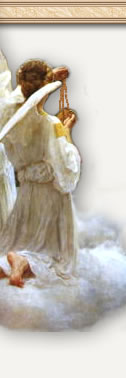




 |
|

|
|
|||||||||||
|
|
|
|
||||||||||||
 |
|
|
||||||||||||
 |
|
 |
|
|||||||||||
|
|
||||||||||||||
 |
 |
|
|
|
|
The Semi-Traditionalists The Vatican levelled the Fraternity of St. Peter this summer-but most painful is the unfolding debacle within the order itself. For years there has been speculation about division within the Priestly Fraternity of St. Peter (FSSP), the order created by Pope John Paul II in 1988 to regularize those priests who had been associated with Archbishop Marcel Lefebvre's Society of St. Pius X. Now the division is out in the open, with consequences that could prove fatal to the order. As a result of a series of questions-a "dubium," in Church law lingo-presented to the Congregation of Divine Worship at the initiative of the liberal element within the Fraternity, that Congregation-after consulting with the Congregation for the Doctrine of the Faith, the Pontifical Commission Ecclesia Dei, and the Pontifical Council for the Interpretation of Legislative Texts-issued a fateful protocol in early July. Simply put, in Protocol 1411/99 the Vatican has ordered that any priest, even one belonging to an institute enjoying the privilege of using the 1962 Roman Missal, may freely celebrate or concelebrate Mass using the revised Missal of 1970 with no impediment whatever, the will of their superiors notwithstanding. But the Vatican went further, mandating that FSSP priests must say the new Mass or concelebrate under some conditions. Thus in one brief statement the Vatican repudiated the agreement it had reached with the Fraternity in 1988, and Fraternity liberals, in orchestrating this, relinquished a privilege-exclusive use of the liturgical books of 1962-for which a few thousand priests around the world continue to yearn. To reconstruct the sequence of events leading up to Protocol 1411/99 it is necessary to look back to 1988, to the Vatican negotiations that sought to incorporate Archbishop Marcel Lefebvre's Society of St. Pius X into the mainstream of the Church. Although the Vatican conceded Lefebvre's point on the Mass and even agreed to charter all his seminaries and schools, the Archbishop came to the conclusion that Rome could not be trusted to live up to the agreement; and on June 30, 1988, he went ahead and consecrated four bishops against the will of the Pope. A group of priests who until then belonged to the Society approached the Vatican to found an order of priests in full union with the Holy See that would be dedicated to offering the Mass and sacraments according to the liturgical books of 1962. Crucial to its founding was the Vatican's guarantee that Fraternity priests could use the old rite exclusively. This was the agreement that Fr. Josef Bisig, who would become the order's superior general, and fifteen other Lefebvre priests, believed they had reached with Cardinal Ratzinger and Pope John Paul II. Oddly, when the Fraternity's constitution, based on this agreement and containing the words "exclusive use," was submitted, the Pontifical Commission Ecclesia Dei refused to accept the use of the word "exclusive." In retrospect, the matter should have been settled right then, to guarantee the terms of the original agreement in clearer language. In any event, the Fraternity's final constitutions were never approved, but the substance of what had been agreed to was generally understood by everyone involved; so much so that Fraternity priests who offered the new Mass in violation of their interim constitution were disciplined. (Why such men were ordained to this order is a good and pregnant question.) In May of this year an election was held to an extraordinary chapter-a meeting of select members of the order-that among other things would discuss the substance of the Fraternity's constitution. Some ninety-one Fraternity priests could vote. When all the votes were counted, it was the most traditional of the traditionalists who had been elected-all priests who were known to be opponents of concelebration or celebration of the Novus Ordo. (It should be noted that no FSSP priest rejects the validity of the new rite.) When Fr. Bisig received the July 3 protocol, it was accompanied by a Vatican rebuke: word that permission for the extraordinary chapter had been withdrawn. With this extreme canonical step, the Ecclesia Dei Com-mission bypassed and overrode the internal government of the FSSP. The Commission also decreed that a plenary session of all incardinated Fraternity priests would take place in the fall, at which time an apostolic delegate would meet with them to discuss the present situation. Just as stunning, and just as brutal, was Rome's instruction to Bisig, a centrist in the order who has been positively compliant in his dealings with the Vatican, that he could no longer exercise his authority as superior general except in routine daily administrative matters. He was told he could not make personnel decisions such as the transfer of his men, at least until November. Bisig notified his district superiors of the withdrawal of permission for the chapter and about the plenary meeting with the apostolic delegate in the fall. District superiors were also given a copy of the protocol. Bisig's next step was to contact Cardinal Ratzinger to try to persuade him to keep the protocol from being made public; he wanted time to go to Rome to address the situation. Ratzinger replied that this could not be done. Bisig flew to Rome and met with Cardinal Jorge Medina Estevez, prefect of the Congregation for Divine Worship, on July 23. Cardinal Medina is reported to have insisted that this protocol, the result of questions that had been addressed to his congregation by traditionalists and non-traditionalists, had been well thought out and was not going to change. The traditionalists to whom Cardinal Medina referred are a group of people mostly from France, 16 FSSP priests and some laymen, who had submitted the dubium at a meeting with Msgr. Camille Perl of the Ecclesia Dei Commission at the end of June but had broached it with people in the Vatican long before that, say reliable sources. It is less clear who the non-traditionalists are-possibly the French bishops who have sought concessions from the Fraternity for a long time and whose "hatred"-Cardinal Silvio Oddi's word-for Lefebvre and traditionalists is widely known. We know nothing about Bisig's meeting with Cardinal Ratzinger on July 25. Apparently, Ratzinger echoed the remarks of Cardinal Medina: Protocol 1411 cannot be changed. At some point, Bisig was joined in Rome by Fr. Louis Marie de Blignieres, prior of the Fraternity of St. Vincent Ferrer. A meeting took place during the week of July 25 with Bisig, possibly Fr. Blignieres, Cardinals Ratzinger, Medina and Felici (president of the Ecclesia Dei Commission), and Msgr. Perl. Bisig implored them to reconsider the protocol-which, he said, would utterly rend the fabric of unity within the Fraternity. Moreover, it would provide further ammunition for the Society of St. Pius X, which of course has been asserting from the beginning that the Vatican was not dealing honestly with traditionalists. He also reminded everyone that the Fraternity was in the process of constructing two expensive international seminaries, and that Rome's moves would endanger fundraising among traditional laity. The cardinals' responses were disappointing, to say the least. Medina reiterated his understanding of Fr. Bisig's concerns and professed his friendship, but spoke as though he had had no choice but to issue the protocol. It was Cardinal Ratzinger who seemed to have understood Bisig's point of view most clearly. He counseled that Fraternity priests at least concelebrate with any ordinary, especially on Holy Thursday. This strategy, he argued, would have two potential outcomes: on the one hand, it would reveal the fraudulence of claims by hostile bishops that they would be more amenable to FSSP involvement in their dioceses if this concession were made-it would call their bluff. And, at the same time, friendlier bishops could offer greater acceptance of the Fraternity. (Cardinal Ratzinger made no move to reverse the protocol when he had the opportunity; according to the Ecclesia Dei Commission, the Congregation for the Doctrine of the Faith was consulted before the protocol was issued.) Cardinal Felici, for his part, is reported to have said next to nothing. Monsignor Perl argued straightforwardly for bi-ritualism. According to reliable sources, Fr. Bisig left the meeting very pessimistic about the future of the FSSP. He is appealing to the Apostolic Signatura concerning the withdrawal of permission for the extraordinary chapter. Only the terminally naive will find hope in that.
How this unhappy situation could have arisen demands explanation. A key factor, mentioned above, has been the influence of Fraternity priests in Europe, and especially in France, who want to be able to offer the new Mass. Father Bisig denied the existence of this group (in a letter to the editor of TLM Summer 1999). The motives of these priests are not clear. A plausible explanation is that since the French bishops have imposed an almost complete block on the Fraternity in France, they may have supposed that these kinds of concessions might make the Fraternity's life easier. The claim of the French bishops has been that since there is a shortage of clergy, they would need Fraternity priests to offer Mass in both rites. The immediate catalyst, however, was the election that was held in May to the extraordinary chapter. The election results, which were such an overwhelming show of support for the Fraternity's most traditional men, were a shock to those European FSSP priests who had thought that the extraordinary chapter, during which revisions and softening of the order's constitution would be discussed, might be an opportunity to introduce the options of using the "1965 Missal" or concelebration using the Missal of 1970. The results of this election were announced in early June. Toward the end of the month a delegation of mostly French priests who had lost in the chapter elections, and laymen, approached the Ecclesia Dei Commission with the message that the most extreme elements of the FSSP had been elected-people who they claimed were schismatic in leaning. It was this that Ecclesia Dei used as the pretext for Protocol 1411, and it is believed that the word "schismatic" was used in the original letter to Fr. Bisig informing him of the withdrawal of permission for the extraordinary chapter. This fear that schismatic elements had taken over the Fraternity as result of these elections-even though the truth is that the men elected sought nothing more than the continued observance of the Fraternity's original agreement with Rome-was used to cancel the chapter. The present situation also has roots in the recent past. The Ecclesia Dei Commission has always been composed of priests dedicated to "bi-ritualism"-especially Cardinal Augustin Mayer, its first chief, and Msgr. Perl, who (privately) has been very blunt in his stance. The Commission's position became especially clear following the controversy last summer surrounding the actions of Fr. Bruno LePivain-a friend of Fr. Arnaud Devillers, the U.S. superior-who concelebrated the new Mass while studying for an advanced degree in Rome. In the wake of that incident the Commission sent Fr. Bisig a letter stating: 1) he could not forbid his priests to concelebrate with a bishop; 2) any FSSP priest could have access, if he wished, to the 1965 liturgical books; 3) even those priests who use the 1962 books could begin the Mass at the chair rather than at the foot at the altar. This letter was revealed to the Fraternity's rank-and-file clergy. Their response, several months later, was to elect the toughest men to the extraordinary chapter. The Fraternity itself has sent the Ecclesia Dei Commission mixed signals, routinely ordaining men who are interested in "bi-ritualism" and concelebration-an open secret well known to Rome. One, Fr. Nathan Vale, who was saying the new Mass while at Fordham University in New York, after completing his studies has been given a position teaching Scripture and Patristics at the seminary. In another incident, Fr. Peter Gee announced at a February 1999 meeting of all Fraternity priests of the North American district that at his chapel he was already reading the epistle and Gospel in the vernacular at the altar. Father Bisig, who presided at the meeting, said nothing, again giving the (correct) impression that the Fraternity considered such matters unimportant. While trivial compared to heresy, they are indeed important in an order charged with preserving the traditional Latin rite. Moreover, and perhaps most significantly, Fr. Bisig had told Vatican officials long ago that although the Fraternity did not wish to concelebrate or to use the new Missal, of course he would if he were ordered to. This is like informing a cat burglar that although you would disapprove of any attempt to steal from your safe, it was behind the painting in the living room. Equally regrettable has been not only the Fraternity's failure to restrain some of its members-whose goodwill we don't question- but also its elevation of some of its softest elements to positions of influence. Father Bisig had known that there were elements in Europe, especially in France, who were pushing for the right to concelebrate or say the new Mass. He refused to quiet them. He promoted some to positions of power. In fact, one was sent to Versailles, the jewel of the FSSP's apostolates, which has over 1,000 people coming to Mass every Sunday. In America, say Fraternity insiders, an ambiguous French centrist reigns-Father Arnaud Devillers, district superior for North America. And although Fr. Bisig knew that at least two key district superiors were in contact with the Ecclesia Dei Commission behind his back, he again made no move to replace them. As of this writing Fr. Bisig is insisting that Protocol 1411 does not apply to the FSSP because it violates the agreement that was reached with Cardinal Ratzinger in July 1988. Fr. Devillers tells us he agrees, and that he did not sign or see the dubium. There can be no question that Bisig is correct, but there is plenty of the story still to play out, especially on the part of Fraternity priests who resorted to such methods to secure their designs, and are poised to dominate the order once the fall meeting is held. But the Vatican itself has double-crossed those traditionalists who all along have remained loyal to the Holy See. Naturally, Protocol 1411 will further alienate the Society of St. Pius X by confirming what they have always argued-that the indult and the Ecclesia Dei Commission were temporary inducements by which unwitting traditionalists would be seduced into accepting the liturgical innovations of Vatican II. This was Archbishop Lefebvre's insight, and was in fact a key part of his case for ignoring the Pope's offer of a truce. These are the facts as we have been able to piece them together from reliable sources. On August 30, Father Bisig issued a carefully worded statement which we reproduce in this issue. It concedes discontent among his brothers but reveals little. Given the secrecy with which the Fraternity leaders habitually operate, other facts will emerge only later. We will report them to readers. We're not inveighing against concelebration. Concelebration was done for several centuries, though there had to be a reason the Church dropped the practice. Nor do we think it wrong for a priest to say the new Mass-some of our best friends do. Hundreds of our readers do. The point, rather, is that the Fraternity of St. Peter was supposed to be different, a refuge for traditionalists, indeed for priests who in conscience don't wish to say the new Mass. The order has been raising money for ten years on the basis of its claim, which insiders knew was increasingly tenuous as some in the order gained power, that it was a traditionalist haven. Now the Vatican has disproved that claim-and in the process proved another: Rome was less than sincere in 1988. But perhaps the most chilling effect of the Fraternity liberals' coup is that once Rome hands them the remaining positions of power (which seems inevitable), they will be able to drum out of the order any priest who refuses to concelebrate-or any seminarian who is suspected-for "rigidity." Think about that. |
|



♦ About The Mass ♦ Resources ♦ How To Help ♦ Contact Us ♦